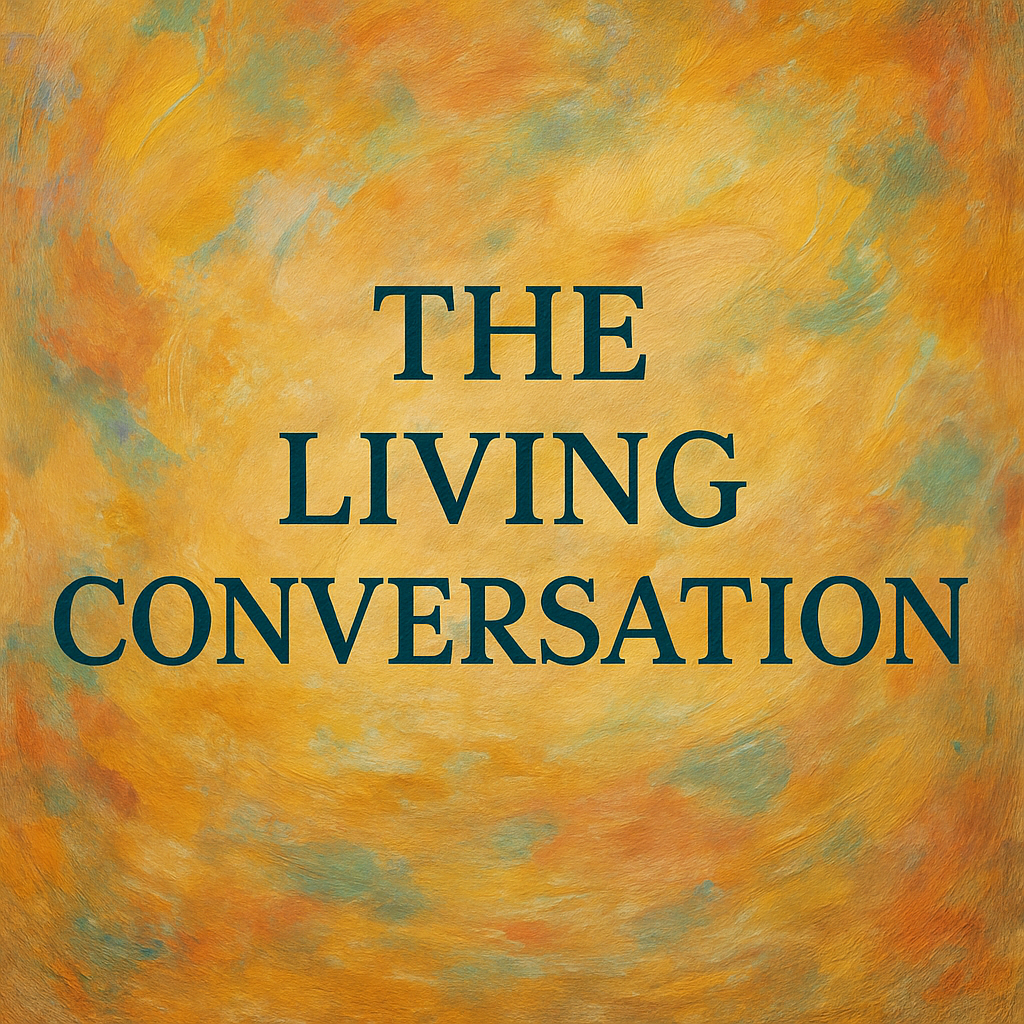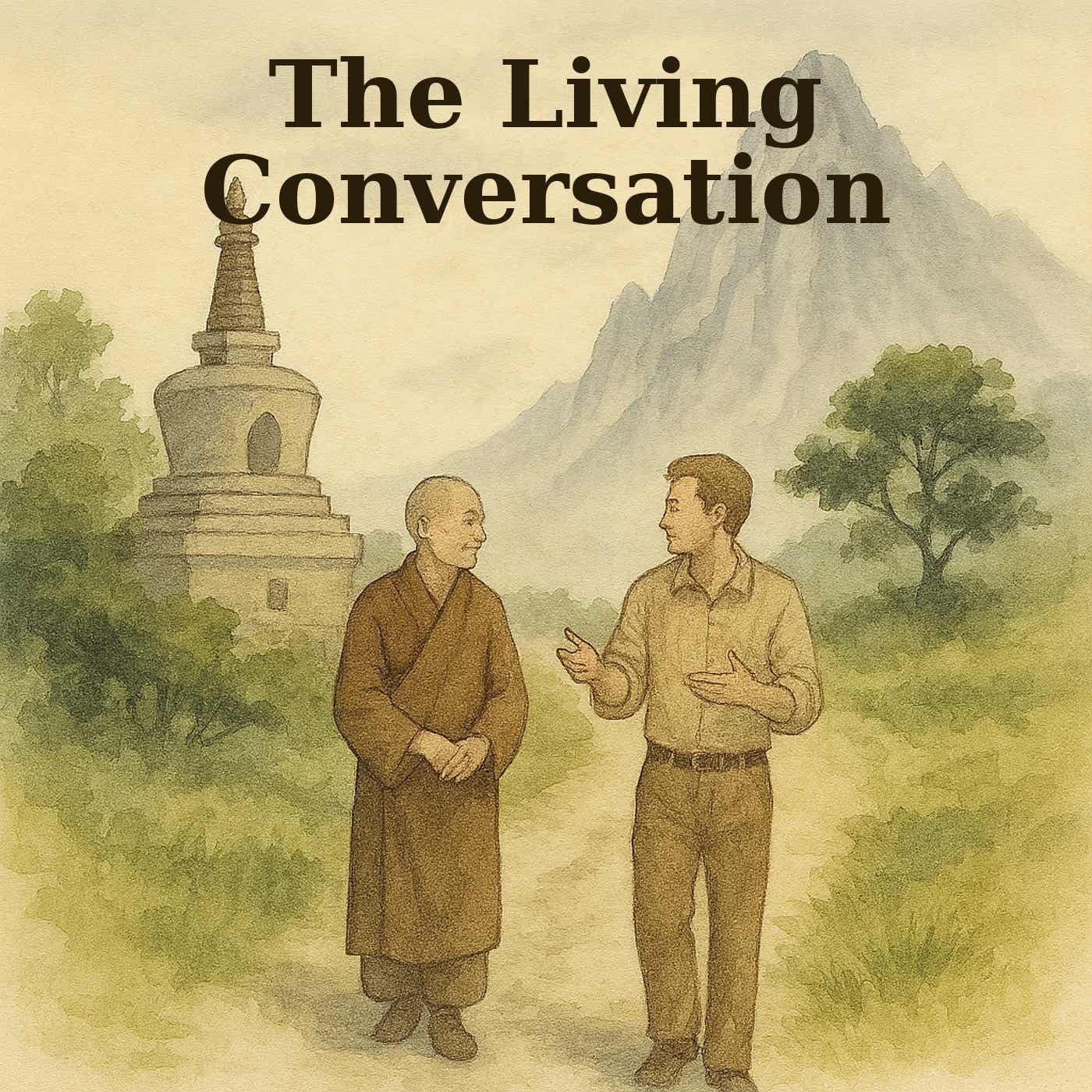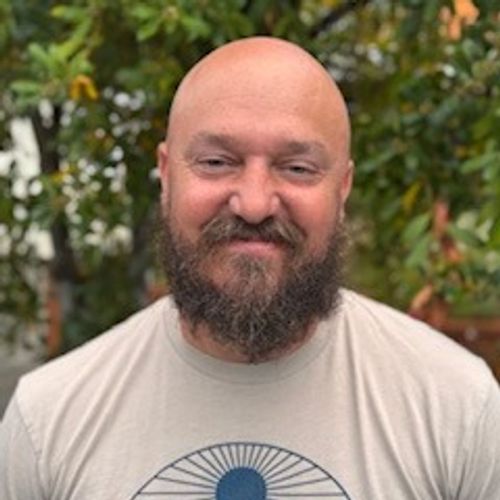Nick Egan PhD: Leaving Home as Half the Dharma — Lived Philosophy from Tibet to Leadership
In this episode of The Living Conversation, Adam Dietz and Anthony Wright speak with Nick Egan PhD, a philosopher, traveler, and executive coach who bridges the worlds of Tibetan wisdom and modern leadership.
Nick shares stories from his years in Nepal, Bhutan, and Tibet, and the lessons learned from living among monasteries rather than merely studying them. Together, they explore Milarepa’s idea that “leaving home is half the dharma,” the value of discomfort, and how authentic practice shows up in daily life; whether in a Himalayan village or a corporate boardroom.
🧭 Topics include:
- Zen and Tibetan approaches to practice and presence
- How “leaving home” transforms perspective
- Integrating spirituality and leadership
- Why everything, in the end, might be “all right”
Conversation Highlights:
- (00:02:00) Nick’s first journey through India, Japan, and Nepal
- (00:04:30) Adam & Anthony reflect on Japan, Taiwan, and lived philosophy
- (00:06:10) Milarepa’s teaching: “Leaving home is half the Dharma”
- (00:08:50) How Tibetan culture honors serious practitioners
- (00:09:56) Advice for finding a teacher and staying present in daily life
- (00:11:00) The joy of teaching and shared awakening
About the Guest:
Nick Egan, PhD, is an executive coach and leadership consultant whose background in Eastern philosophy and years of fieldwork in the Himalayas inform his work with global leaders. He is the founder of Shift Leadership Group and the author of Shift: The Art of Transforming Limitations.
🔗 www.nickeganphd.com | LinkedIn
Connect:
🎧 The Living Conversation is hosted by Adam Dietz and Anthony Wright.
📬 Contact Anthony at Theonaut.com
Adam at dietzadam@gmail.com or visit thewaybetween.substack.com
#TheLivingConversation #NickEgan #Philosophy #Leadership #Tibet #Mindfulness #Dharma #Coaching #LivedPhilosophy
Transcript
Foreign.
Speaker A:I'm Anthony Wright.
Speaker A:I am your co host today on the Living Conversation with.
Speaker A:And our guest today is Nick Egan.
Speaker A:And Nick is a executive coach, but also a philosopher.
Speaker A:And I noticed and Adam was talking about this during one of our.
Speaker A:When we were not recording.
Speaker A:Nick, you've done quite a bit of travel in Asia.
Speaker B:I have, yeah.
Speaker A:How has that informed your understanding of the philosophy?
Speaker B:It's a good question.
Speaker B:To actually be there when I was 8, when I was 18.
Speaker A:Wow.
Speaker B:Immediately after high school.
Speaker A:That's a formative time.
Speaker B:Yeah, it was.
Speaker B:It was a form of time.
Speaker B:So spent four months traveling through Asia, three and a half months, India, Japan and Nepal.
Speaker B:Nepal was my major place.
Speaker B:And that was driven in large part by.
Speaker B:By that time, I had been practicing for already two years Zen and getting my feet kind of wet in the Tibetan side.
Speaker B:So I wasn't.
Speaker B:It wasn't my introduction to the traditions, but it was driven by my understanding of the truth or my practice of the traditions.
Speaker B:And then after that, I.
Speaker B:Through field work and through just visiting again and again.
Speaker B:There's a time when I was bringing back paintings from Nepal.
Speaker B:Some of my knowledge is actually around, like, Tibetan iconography.
Speaker B:And I'm laughing a little bit because at the time, you can make a business, like going to get specific pieces for collectors, some Buddhist practitioners, some not.
Speaker B:So that kind of stuff.
Speaker B:So I had a chance to go there quite a bit and then did field work in a monastery there for better part of a year.
Speaker B:And then after that, I started leading trips.
Speaker B:So leading trips for publication companies or other organizations, sometimes museums, people that wanted to have sort of a cultural guide, somebody that could explain things like I'm explaining now, and also a local guide, too.
Speaker B:And so I got a chance to go back many times, mostly the Himalayas, so Bhutan, Tibet, Nepal.
Speaker B:And then as part of it, you always loop in through Thailand and Southeast Asia.
Speaker B:So I'm very familiar with that area.
Speaker B:And so how it informed.
Speaker B:I mean, there's a tendency in the West, I think, to be a bit precious about spiritual practice.
Speaker B:And we tend to pedestalize it in some ways in a way that when you're immersed in it, it's like, yeah, okay, it is precious and it should be put on a pedestal.
Speaker B:And also, like, go walk around the stupa 10 times, you know, for merit, you know, and go say like a hundred thousand mantras and just shut up and do it.
Speaker B:And it's like everybody's kind of doing that.
Speaker B:And so it's definitely woven into society quite a bit more, at least in especially Like Nepal, Tibetan area.
Speaker A:Yeah.
Speaker A:But I would imagine just the.
Speaker A:Because I was in Taiwan and Japan, and it was rather a different experience for me to go to Kyoto and to go to some of those old temples.
Speaker A:Just the odor of them and the sound of them, but also the vibe, you know, the energy field of.
Speaker A:It still strikes me as interesting that all the Japanese civil service people that are out in public all wear white gloves.
Speaker A:You know, this idea of attending to a social standard that perhaps can be maybe weighty or, you know, trying to impose something.
Speaker A:But I just.
Speaker A:I really appreciate it.
Speaker A:And I would go to the 10 temples and go to the Taoist temples in Taipei.
Speaker A:So it was quite interesting.
Speaker A:So, Adam, do you have anything?
Speaker A:Yeah.
Speaker C:I want to ask you on that note, as you were speaking, I had an experience when we were in China.
Speaker C:Two experiences.
Speaker C:One, when I first arrived, I felt like I just took off my mind and put it aside.
Speaker C:I don't know if it was the cultural consciousness, it being in a different language, but I had the best night's sleep in my life.
Speaker C:I felt like I slept a thousand years in one night, woke up the next day.
Speaker C:That's one.
Speaker C:The other was we had a long plane flight delay when we first arrived.
Speaker C:I guess maybe because these were new, fresh experiences when we first arrived, and they stand out more.
Speaker C:But what stood out to me is in the plain flight.
Speaker C:Even in mainland China, which is not known as very spiritual place, you know, they kind of had a cultural lobotomy with Mao.
Speaker A:Oh, yeah.
Speaker C:But I think we talked about this.
Speaker A:Before in the show.
Speaker C:Confucius and Lao Tzu and Taoism still are so ingrained in society, is deeply ingrained in people's lives and practice.
Speaker C:There's a long way of saying that.
Speaker C:What I remember was having this long plane delay where my wife Sonia and I were kind of getting a little agitated, as Westerners do.
Speaker C:But the vibe on the plane was almost like pure rest and silence, like no one was getting upset.
Speaker C:People weren't even really talking.
Speaker C:It was like they just took that time to completely shut down and rest.
Speaker C:So that stood out to me as unique, unique cultural experience that seemed like we like to talk about on this show, lived philosophy.
Speaker C:It felt like Lao Tzu was in that playing tone.
Speaker C:Everyone, now's a good time to rest.
Speaker C:So I wonder if you have any similar experiences of seeing Tibetan philosophy in practice in just daily life, or Buddhist philosophy in practicing daily life on the ground.
Speaker B:Yeah, a couple things come up for me based on that.
Speaker B:Like, first, just going back to the Japan element, I Mean, I love Japan.
Speaker B:And there's something.
Speaker B:It's funny because I always want to horn people that are.
Speaker B:That have been to Japan and have studied Zen and they come to the Himalayas.
Speaker B:I'm like, you're not.
Speaker B:You're not gonna get the Zen temple.
Speaker B:Like, it's very different, right?
Speaker B:It's very loud.
Speaker B:There could be chanting.
Speaker B:You know, you do so oftentimes wear your shoes.
Speaker B:There could be, like, butter from butter lamps on the ground.
Speaker B:I've even seen, like, cows walk through in.
Speaker B:In Serpu and places like that.
Speaker B:Like, you just don't know what you're gonna get.
Speaker B:So it's very different in that way.
Speaker B:And I think, like, for whatever reason, I love the Japanese aesthetic and feel is truly something magical.
Speaker B:I always tell people, it's like.
Speaker B:It reminds me of, like, the Florence of Asia.
Speaker B:They took this.
Speaker B:All these aesthetics and the practices and sort of heightened them and narrowed them in focus.
Speaker B:And so that's the version that you get in Japan.
Speaker B:But going to your point, Adam, it's bringing up this concept, this quote from Milarepa, who is a famous Tibetan practitioner in the 11th century.
Speaker B:Century.
Speaker B:And he said that leaving home is half the dharma.
Speaker B:And the idea is that if you are willing to, like, leave your attachments and leave.
Speaker B:Get out of your comfort zone, essentially, you automatically shift your perspective quite a bit.
Speaker B:And so I think that there is a felt sense, a lived sense of philosophy in certain elements of Asia, definitely.
Speaker B:And at the same time, like, just getting out of your comfort zone, leaving home, you've already accomplished half.
Speaker B:Right.
Speaker B:So I think that's an element, like when you say, take off my mind and that sort of thing.
Speaker B:But, yeah, from a.
Speaker B:From a lived experience.
Speaker B:There is the thing in Tibetan culture that I think is most striking and maybe not as obvious until you've spent some time there is the absolute respect that people have for serious religious practitioners, not just for monks.
Speaker B:Like, they have respect for monks and stuff in different cultures and all that.
Speaker B:But in Tibet, there's a notion that whether you're a monk or not, if you're a serious practitioner, you're sort of regarded in the same way that we would regard, like, a professor or maybe not a professor, maybe like an astronaut.
Speaker B:Right.
Speaker B:Really, people are really put on a pedestal because they're recognized as, like, doing deep exploration.
Speaker B:That's good for the benefit of humanity, good for the benefit of something that we don't really have in the west.
Speaker B:That I find.
Speaker A:Yep, yep.
Speaker A: dministration in September of: Speaker B:I think everything is going to be all right.
Speaker B:Do the best that you can to stay present and dancing in the moment as much as you can.
Speaker B:And the more that you do that, the more aligned you'll be with your true self.
Speaker B:And that just makes things flow more smoothly.
Speaker B:Would be my advice from a general perspective.
Speaker A:Is there like a meditative practice.
Speaker B:Yeah.
Speaker B:That you recommend and Zogchen.
Speaker B:No, I recommend seek out.
Speaker B:If you're interested in meditative practice, find a good teacher.
Speaker A:Okay.
Speaker A:And how.
Speaker A:Coach.
Speaker A:How would coach us about coaching?
Speaker A:How would we do that?
Speaker A:You know, how do we know what fits?
Speaker A:You know?
Speaker B:Yeah.
Speaker B:They say you have to.
Speaker B:In the Tibetan tradition, they say analyze the teacher for three years before taking him as a serious.
Speaker B:As your main teacher.
Speaker A:Oh, wow.
Speaker B:I think that's good.
Speaker B:Like take teachings, go out, cast your net wide.
Speaker B:But I gotta tell you, in my experience, the best way to find a good teacher is to see.
Speaker B:To look around and see who lights you up in an intuitive sense.
Speaker B:When the student is ready, then that teacher does appear.
Speaker A:Yeah.
Speaker A:I've had so much fun with my students here at Sonoma State.
Speaker A:When there is a connection and the lights go on and then it's just.
Speaker A:And I'm.
Speaker A:I think, Adam, you've had that same experience.
Speaker C:Yeah.
Speaker A:So before we're done, Adam, is there anything that you have.
Speaker A:No.
Speaker C:That was a great ending.
Speaker C:Well said.
Speaker A:Okay, well, I'm Anthony Wright and I'm your host today on the Living Conversation and attunement with my co host.
Speaker A:And you can contact me@theonaut.com that's T H E O N A U T like astronaut, but I'm a theonaut.com and how can people contact you, Adam?
Speaker C:Yeah, I guess I would like to say a little something about just me, you know, if you're liking what we're doing here, please like subscribe, share comment.
Speaker C:Obviously comment is really important.
Speaker C:I think we may do a mailbag type of segment soon.
Speaker C:Comments are kind of accumulating that we can use on the show so you can look us up on YouTube.
Speaker C:That's a big place for us, the living conversations on there.
Speaker C:But yes, all my links are on substackewaybetweenubstack.com and you can contact me directly@dietsadammail.com.
Speaker A:D I e T Z and Nick, thank you so much for being with us.
Speaker A:How can people contact you?
Speaker B:Yeah, it's been a pleasure.
Speaker B:I really appreciate the time.
Speaker B:You can find me on LinkedIn.
Speaker B:It's the easiest way.
Speaker B:Or you can get in touch with me on my personal website, which is nickeganphd.com or my leadership development and executive coaching company is Shift Leadership Group.
Speaker A:Great.
Speaker A:So thank you for being with us.
Speaker A:And I'm Anthony Wright and I am.


